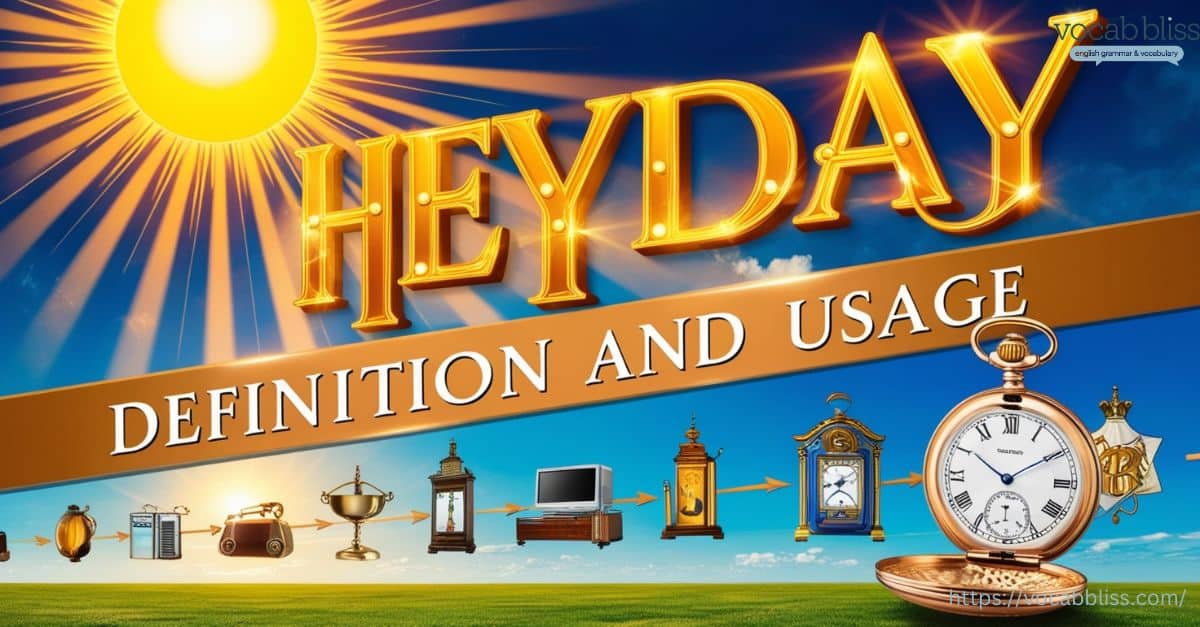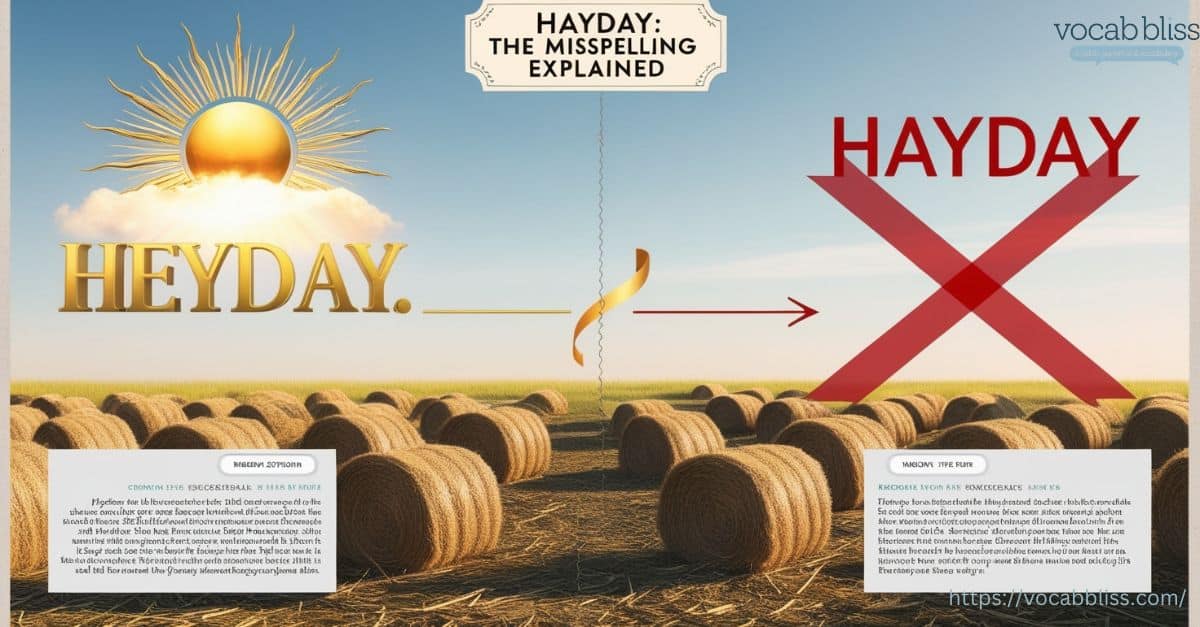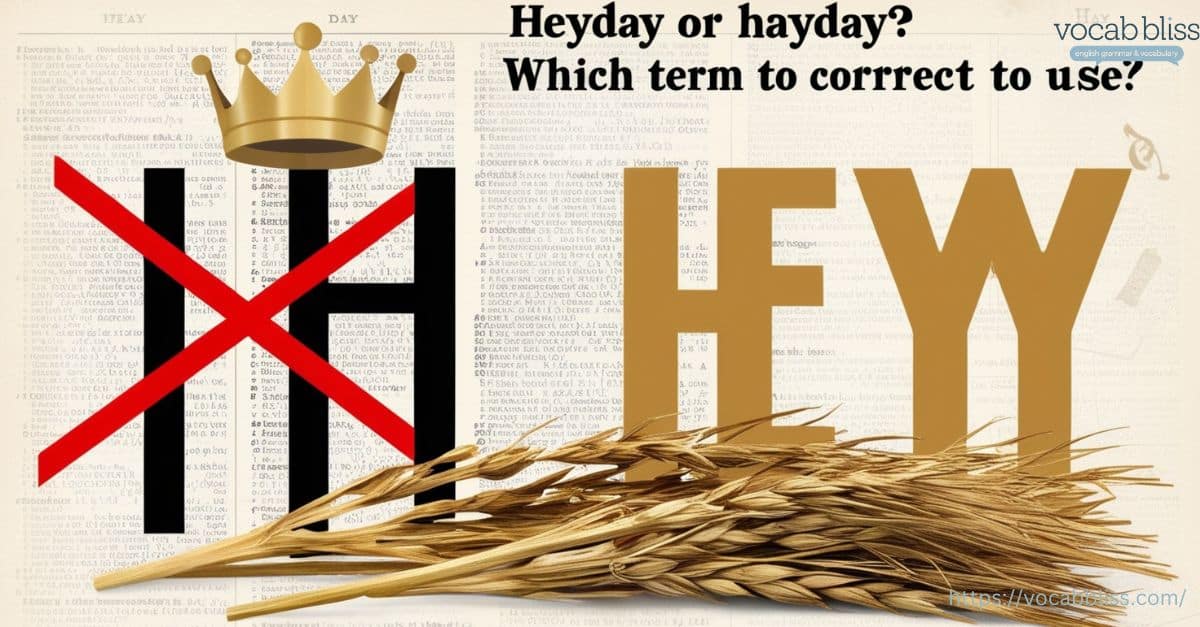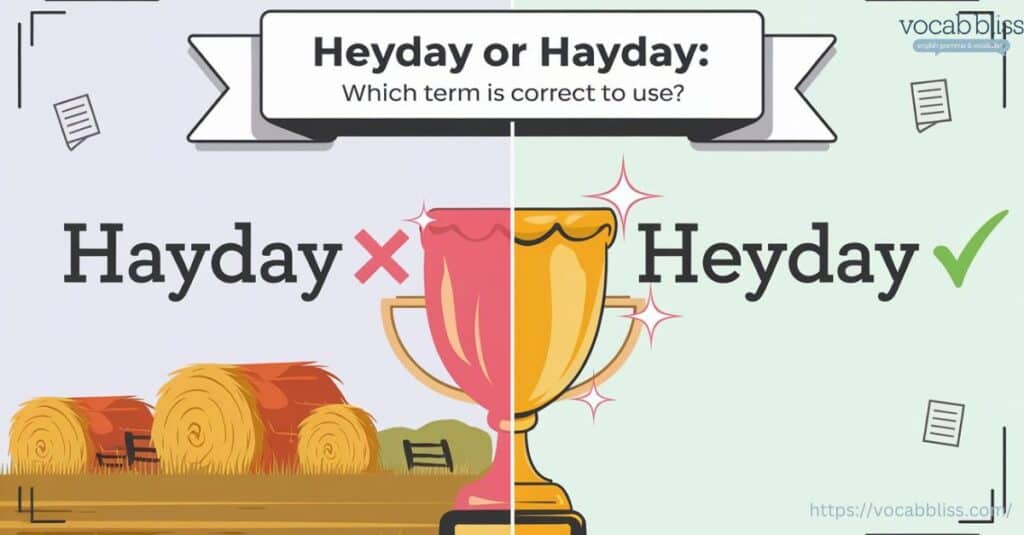If you’ve ever wondered whether to use hayday or heyday, you’re not alone. These words sound similar, but only one of them is correct in standard English. Misusing them can cause confusion, especially in formal writing or professional contexts. Let’s dive deep into their meanings, origins, and proper usage so you never mix them up again.
Quick Summary
In this article, we explored the confusion between hayday or heyday, clarifying that heyday refers to a period of peak success or prominence, while hayday is an incorrect spelling. We delved into the historical origins of heyday, its usage in both business and everyday contexts, and offered practical tips for remembering the correct spelling. By providing examples, context, and common errors, we’ve ensured that readers can confidently use heyday without mixing it up with hayday, whether in formal or casual communication.
Read More: Ignitor Or Igniter: When & Where to use?
Understanding the Confusion
Why People Mix Up hay day or hey day
The mix-up between hey day or hay day is common due to their identical pronunciation. When spoken, the two words sound the same, which often leads people to assume they are interchangeable in writing. The issue is further complicated by the fact that “hay” is a real word associated with farming, giving hay day an air of plausibility.
This confusion is particularly noticeable in informal settings or online content, where spelling errors are more likely to go unchecked. Additionally, many people don’t use the term heyday as frequently as more common words like “prime” or “peak,” making it unfamiliar to them.
The Role of Pronunciation and Spelling Variations
Phonetically, hayday or heyday are indistinguishable, which contributes to their frequent interchange. Without prior knowledge of the correct spelling, it’s easy to choose hayday as it appears more intuitive. The lack of emphasis on spelling nuances in casual speech or informal communication compounds this problem.
Regional accents and dialects may influence how people perceive and understand the word. For instance, in some accents, the pronunciation of “hey” may sound similar to “hay,” reinforcing the error in writing.
Clear Definitions of hayday or heyday
Heyday: Definition and Usage

The word hey day refers to a period of peak success, popularity, or vigor. It signifies the “golden age” or the prime of a person, organization, or concept. People widely use this term to describe moments when something or someone was at its absolute best.
For example:
- “The 1960s marked the heyday of rock and roll music.”
- “During its heyday, the company was a leader in technological innovation.”
The term is versatile and can apply to individuals, industries, movements, or cultural phenomena. Whether it’s the heyday of a sports team or an artist’s career, the word consistently emphasizes a peak period of achievement.
Hayday: The Misspelling Explained

On the other hand, hayday is a misspelling of heyday. While it might look like a plausible variant, it is not recognized as a legitimate word in English. The confusion arises because people associate “hay” with farming, as seen in phrases like “making hay.”
Using hayday instead of heyday can make writing appear less credible. For instance, writing “The 1990s were the company’s hayday” may cause readers to question the writer’s attention to detail.
To clarify:
- Heyday is the correct word for describing a peak period of success.
- Hayday is simply a common spelling error, not an alternative hay day meaning.
The True Hey day Meaning
Heyday Meaning and Context
Heyday refers to a time of peak success, vigor, or prominence. It symbolizes the pinnacle of achievement, often associated with a golden age or a prime period. The term can describe the flourishing years of an individual, an organization, a trend, or even a cultural phenomenon.
For instance:
- “The actor experienced his heyday during the blockbuster era of the 1990s.”
- “Vinyl records are enjoying a modern heyday among music enthusiasts.”
In everyday communication, heyday is synonymous with words like “peak or prime and zenith. It reflects not just success but the vibrancy and excitement of that peak period.
Historical Roots: The Heyday Etymology
The word heyday has fascinating origins rooted in the English language. It stems from the Middle English expression heydey, which was an exclamation of joy or surprise, akin to saying “hooray” today. Over time, the term evolved to represent a period of happiness or triumph.
Etymologically, heyday combines the Old English word hey, expressing enthusiasm, with day, symbolizing time or a period. Together, it came to denote a time filled with vitality and success.
The first recorded use of heyday in its modern sense dates back to the 16th century. It transitioned from being an exclamation to a descriptive noun, emphasizing a flourishing period.
How Heyday Is Used in Modern Communication
In contemporary communication, heyday is often used to describe past periods of success or to highlight an ongoing resurgence. For example:
- “The heyday of print newspapers may be over, but they still hold value for certain audiences.”
- “Streaming services are currently in their heyday, redefining the entertainment industry.”
People commonly use the term in casual conversation, business communication, and journalism to succinctly convey the idea of a prime time.
Example of heyday in a sentence:
- “In her heyday, the singer sold out stadiums worldwide.”
Whether reflecting on the past or describing a current boom, heyday remains a powerful word to capture moments of excellence and significance.
Why Hayday Is Incorrect
Common Errors Associated with Hayday
The term hayday is a frequent misspelling of the correct word, heyday. While it may seem like a plausible variation due to its pronunciation, hayday is not recognized in English dictionaries. This error often stems from confusion between the words “hey” and “hay,” as “hay” is a familiar term in farming and rural contexts.
Some of the most common mistakes associated with hayday include:
- Misinterpreting it as a legitimate alternative spelling of heyday.
- Using hayday in formal or professional communication, which can undermine the credibility of the writing.
- Associating hayday with agricultural imagery, due to the word “hay,” leading to unintended and humorous misinterpretations.
For example, someone might mistakenly write:
- “That was the company’s hayday, when profits soared.”
This misstep not only looks unprofessional but can also confuse readers unfamiliar with the term’s correct spelling.
Real-Life Examples of Misusing Hayday
Errors involving hayday are not uncommon and can be found in various forms of media, including blogs, advertisements, and even social media posts. Here are a few hypothetical but realistic examples of how hayday is misused:
- In Social Media Posts:
- Incorrect: “The 90s were my hayday!”
- Correct: “The 90s were my heyday!”
This casual error often occurs in unedited posts where spelling isn’t a priority.
- In Business Presentations:
- Incorrect: “Our hayday was during the early 2000s when we dominated the market.”
- Correct: “Our heyday was during the early 2000s when we dominated the market.”
In professional contexts, such mistakes can make presentations appear careless.
- In Blog Content:
- Incorrect: “The hayday of typewriters ended with the rise of computers.”
- Correct: “The heyday of typewriters ended with the rise of computers.”
Blogs that aim to educate or inform readers must use the correct spelling to maintain authority.
Differentiating Heyday
Heyday vs Hay Day: Are They Related?

The terms hayday or heyday are often confused due to their similar appearances, but they are fundamentally different in meaning and usage.
- Heyday: Refers to a peak period of success, achievement, or prominence. For example:
- “The heyday of the cinema industry was during the golden age of Hollywood.”
- Hay Day: While not a formal term in English, hay day could be interpreted literally as a day associated with hay, such as a day dedicated to cutting or baling hay in agricultural contexts. It may also be mistakenly used as a playful or creative term, such as the title of the popular farming game, Hay Day.
The two terms are unrelated, with heyday having historical roots in expressions of joy and hay day being more about rural imagery or informal language. Using hay day instead of heyday in the wrong context can lead to misinterpretations or a lack of clarity.
Synonyms and Alternatives for Heyday
If you’re looking for synonyms or alternative phrases to replace heyday, several options can effectively convey the same meaning:
- Prime: Refers to the most successful or flourishing period.
- Example: “She was in her prime during the championship years.”
- Golden Age: Often used to describe a peak era in history or culture.
- Example: “The golden age of aviation revolutionized global travel.”
- Pinnacle: Denotes the highest point of success or achievement.
- Example: “Winning the Nobel Prize was the pinnacle of his career.”
- Zenith: Represents the most successful or powerful time.
- Example: “The artist reached her zenith in the early 2000s.”
- Peak: Highlights a period of maximum success or activity.
- Example: “His career was at its peak during the late 1980s.”
Practical Tips to Remember
Memory Aids: to Avoid Confusing Heyday or Hayday
Remembering the difference between heyday or hayday can be simple if you use a few practical memory aids:
- Think of “Hey!” as excitement: The word heyday is rooted in expressions of joy and triumph. Associate the word with the exclamation “Hey!” to remind yourself it represents a time of success or peak moments.
- Example: “Hey! It’s my heyday!”
- Visualize hay as literal: The term hayday isn’t correct, but if you mistakenly think of it, imagine a farm scene with stacks of hay. This mental picture helps reinforce that hayday is more about agriculture and has no connection to flourishing periods of success.
- Etymology reminder: Know that heyday comes from Middle English, emphasizing joy and vigor. This historical context helps distinguish it from unrelated terms like hayday.
- Mnemonic device:
- “Heyday equals hooray day—celebrating success.”
By using these simple tricks, you can easily avoid confusing the two terms and ensure accurate usage in writing and speech.
Contextual Examples to Solidify Understanding
Examples are a powerful way to embed the correct usage of heyday in your mind. Here’s how it fits naturally in sentences:
- Correct: “The heyday of the Renaissance saw unparalleled achievements in art and science.”
- Incorrect: “The hayday of the Renaissance saw unparalleled achievements in art and science.”
- Correct: “During her heyday, she was the fastest runner in the world.”
- Incorrect: “During her hayday, she was the fastest runner in the world.”
Quick Reference Table
| Term | Meaning | Usage Example |
|---|---|---|
| Heyday | A period of success or peak performance | “The 90s were the heyday of grunge music.” |
| Hayday | Incorrect spelling of “heyday” | “The 90s were the hayday of grunge music.” (wrong) |
These examples and tools ensure you’ll never mix up heyday with hayday again!
Examples of Heyday in Context
Business Communication: Using Heyday Appropriately
In business communication, heyday can be used to describe a period of peak performance, growth, or innovation. It helps convey the idea of a time when a company, team, or industry was thriving. Here are a few examples of how to use heyday correctly in a professional context:
- Correct: “The company’s heyday came in the early 2000s, when they dominated the tech industry.”
In this example, heyday is used to describe a period of unparalleled success and dominance in the market. - Correct: “During its heyday, the startup revolutionized online shopping.”
Here, heyday emphasizes the time when the company was at the height of its success. - Correct: “In the heyday of the automotive industry, sales were higher than ever before.”
This usage reflects a historical peak in an industry, illustrating how heyday captures the concept of a flourishing time.
In business reports or presentations, using heyday helps convey the idea of success but must be used with accuracy to maintain professionalism.
Everyday Scenarios: Heyday in Informal Speech
In more casual conversations, heyday is often used to reflect a nostalgic sense of fondness or admiration for a past period of time. It’s typically used to talk about someone’s or something’s peak moments. Here are some examples of heyday in everyday scenarios:
- Correct: “I miss the heyday of the 90s—music, fashion, and everything!”
This example is a nostalgic reference to a time when things were at their most exciting or enjoyable. - Correct: “When I was a teenager, I was in my heyday—I could run faster than anyone!”
Here, heyday is used to describe the speaker’s prime years, emphasizing their peak physical condition. - Correct: “The team’s heyday was when they won the national championship three years in a row.”
This informal statement is a way to highlight the best period of the team’s history.
In casual speech, heyday often carries a tone of fond remembrance or a celebration of a peak moment, making it an excellent way to express admiration for the past.
Using heyday in these different contexts—business or casual—helps reinforce its meaning as a time of success, achievement, and high points.
Origins and Evolution of Heyday
Linguistic Development Over Time
The word has evolved from a simple exclamation (“hey!”) to a noun symbolizing success. Its modern usage became common in the 18th century.
The Word’s Journey into Modern English
Through centuries, heyday maintained its association with excellence and high spirits, adapting seamlessly into modern language.
Conclusion
In conclusion, understanding the difference between hayday or heyday is essential for clear and accurate communication. Heyday refers to a peak period of success or prominence, while hayday is a common misspelling with no correct usage in the English language. By recognizing the historical roots of heyday, using it properly in business or everyday speech, and avoiding the confusion with hayday, you can ensure your writing and conversations remain precise and professional. Always remember the mnemonic tricks and examples to keep heyday in its rightful place!
Frequently Asked Questions
- Is it hay day or heyday?
The correct term is heyday.
- Why is it called a heyday?
It comes from an old English expression of joy, representing a time of success or prosperity.
- What does it mean to be in your heyday?
It means being in the peak period of success, achievement, or ability.
- What is hayday in English?
Hayday is a misspelling of heyday or refers to the mobile game Hay Day.
- Why is Hay Day popular?
Hay Day is popular for its relaxing and engaging farming simulation gameplay.







